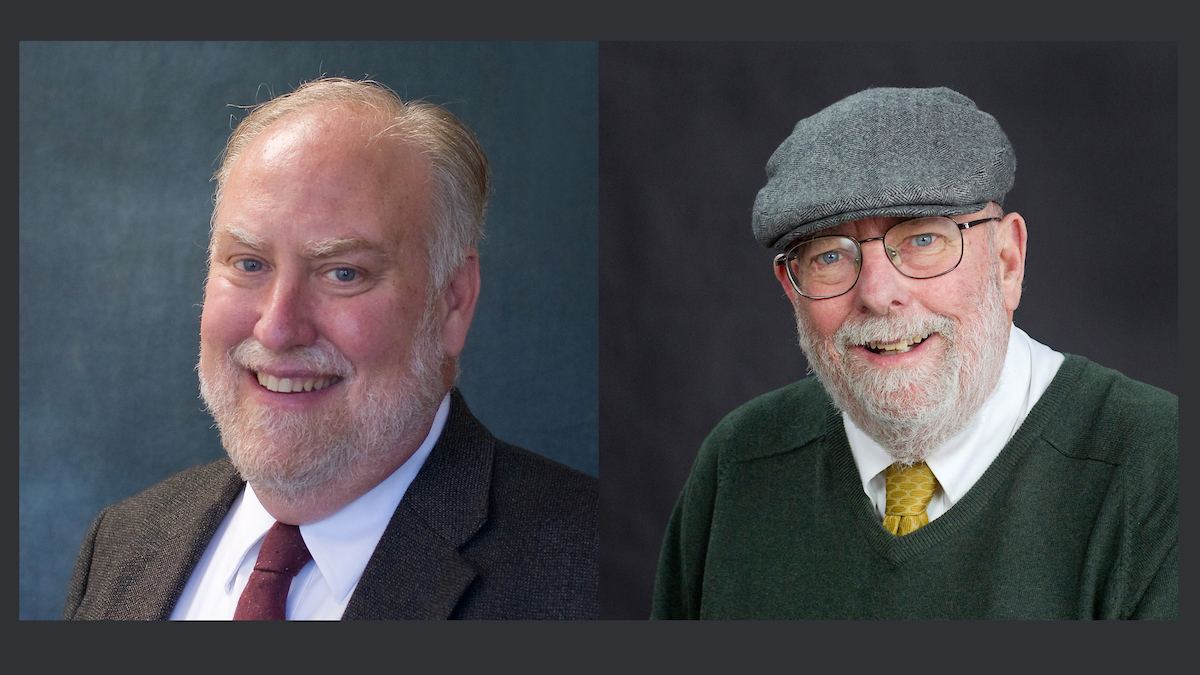
Political Science Professors Dave Robertson (at left) and Terry Jones discussed the fallout from Gov. Eric Greitens’ resignation last week with local and national media outlets. (Photos by August Jennewein)
Missouri Gov. Eric Greitens’ tumultuous 17-month tenure in office came to an end last week with a surprising resignation that took effect at 5 p.m. Friday.
Political scientists at the University of Missouri–St. Louis were in demand for their expertise last week as news organizations tried to make sense of the once-bright political star’s fall after months of scrutiny, including from members of his own party, over an admitted affair and criminal charges of invasion-of-privacy and computer-tampering.
“Here is a central character who is very ambitious, very intelligent and walked into office extremely inexperienced,” Department of Political Science Chair Dave Robertson told St. Louis Public Radio | 90.7 KWMU. “And he was not very well skilled or not very willing to engage in compromise, to engage in building a coalition that would support his governorship and his later ambitions, and I think that helped bring him down.”
His troubles in office could serve as a lesson outside the state’s borders.
“This is a time, not just in the United States, when lots of people want fresh, new blood that doesn’t have any fingerprints on the system of government,” Robertson told KSDK (Channel 5). “Well, that comes with a big cost, and we’re seeing that cost in the Greitens’ tragedy now.
“If you don’t know how to build coalitions, if you don’t know how to build up support for the legislation that you want to have, build up respect among other people among separate branches, you’re going to be in big trouble in the United States in particular because we designed this government so it’d be hard to use unless people cooperate.”
Greitens kept a defiant tone as he announced his resignation last week. UMSL Professor Emeritus Terry Jones said that will only make it harder for him to return to elected or appointive office.
“Americans are quite willing to forgive somebody for transgressions, but they’re not particularly fond of people who transgress and do not admit to it,” Jones told Jefferson City television station KRCG.
Even if a political comeback seems unlikely, public discussion of Greitens figures to continue at least until after Missouri’s hotly contested race for the United States Senate between incumbent Claire McCaskill and presumptive Republican challenger Josh Hawley, the state’s attorney general. Democrats are expected to attempt to tie Hawley to Greitens and use the now former governor’s problems against him as they try to hold onto the seat.
“Greitens supporters will not view Hawley as the second coming of Greitens,” Robertson told the St. Louis Post-Dispatch in a tweeted response to questions. “But Democratic ads against Hawley will portray him as the second coming of Greitens to everyone else.
“So to the extent that Greitens matters in November, he doesn’t do much to energize Hawley’s base, but does a lot to mobilize McCaskill’s base. That’s depending on how much Greitens matters at all – an open question.”
New Gov. Mike Parson is expected to restore some calm in the Capitol as a familiar face, who had experience serving in both legislative chambers before being elected lieutenant governor in 2016.
“One of the contributing factors to the widespread call for Greitens to resign [was] the high level of comfort with having Parson as his successor,” Jones told Governing.
He added of Parson: “He fits the classic profile of a get-along, go-along elected official who is not full of himself and who regards the job as more important than the person in the job.”
Media Coverage
St. Louis Post-Dispatch
KSDK (Channel 5)
St. Louis Public Radio
St. Louis Public Radio
Gateway Journalism Review
Governing
KRCG














